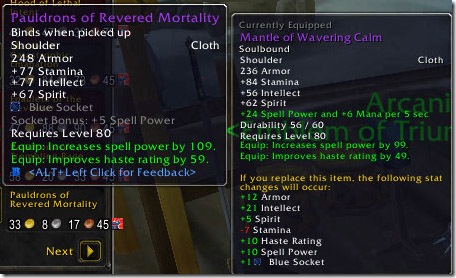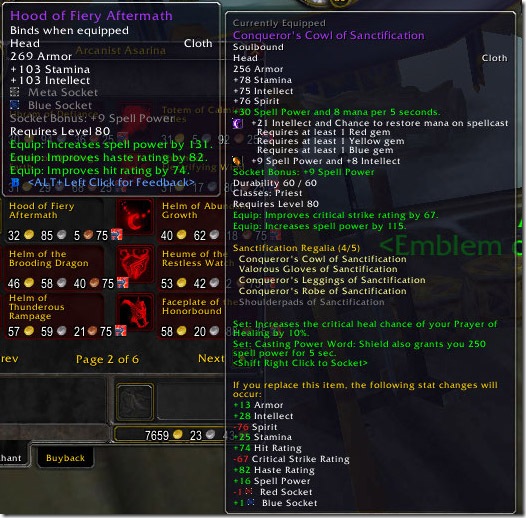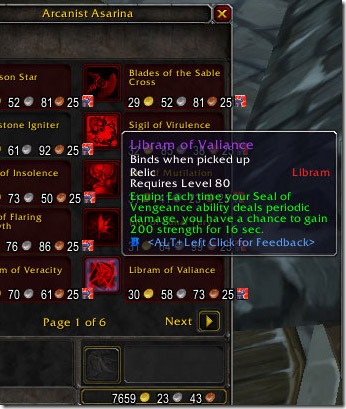
This is a guest post by Professor Beej. Part 2 of 3.
In my last post, I chronicled my ongoing experiences with Online Gaming Addiction that have led me to the point where I am now—I’ve realized I am addicted, and I am trying to rid myself of the problem. Today, I intend to go through the signs that initially helped me realize that I was (and still am, but to a lesser extent) addicted to the hobby in which I have to this point invested eleven years of my life.
If you think that you or someone you know might be addicted to online gaming, then ask the following questions. These are the four points that predominantly signaled that I had a problem.
Has your personality changed?
It’s a given that over the course of our lives, we all change, and sometimes that change is for the worse. Online gaming addicts, however, change for the worse in a very dramatic way, albeit one that might be gradual enough that it goes unnoticed by the addicts themselves. The personality change will probably appear stress-related or just mild crankiness for the first little while, but it might actually stem from a “withdrawal†from the game world. If the personality change persists and grows steadier while the person is away from their game, yet appears perfectly normal while logged on, then it could be a sign of online gaming addiction.
As I grew more engrossed in World of Warcraft’s world, I became more of a jerk to those around me. I was more snide, more sarcastic, and I had very few pleasant things to say about anything or anyone that was not directly related to my success or enjoyment in WoW. It was really like the nice guy I had been all my life had been transplanted with a completely different personality. The more time I spent away from my virtual life in Azeroth, the less amenable to reality I became. As soon as I was logged in again, however, I was chipper and happy and joking all night long. I would ignore friends during the day, yet I would pester them for instance runs later that evening.
Those around me every day never really noticed this behavior. I just seemed occasionally grumpy to them. It was my parents who noticed it growing worse and worse on my visits home from college. It took my mother saying “I don’t like who you’ve become since you’ve gone to college. You’ve really become a smartass†to really make me look at my life and realize that I was going in a direction that I hadn’t even noticed, nor had anyone else. My personality was worsening too gradually for friends who saw me on an everyday basis to really see, but when my parents only saw me every three weeks or so, they would notice that I was getting surlier with each visit. My time away from WoW was becoming less and less pleasant, and my demeanor showed it.
Do you interact with your family and friends in a different, more negative way?
Online gaming addiction not only affects the addicts themselves, but also the people with whom they interact and how they interact with them. If a person becomes addicted to an online game, real life can begin to seem like a distraction, and he or she can begin avoiding or cutting short responsibilities and engagements just to get a little extra time in the virtual world. In addition to my being cranky with my friends and family, I would also interact with them differently than I ever had before I became so engulfed by the game. Gaming addicts’ interactions with others are often limited to online chats and channels without their realizing it. If you or someone you know has stopped most offline socialization and typically only communicates through the game, then there is a good chance that person might be experiencing some level of addiction. I’ve been in this situation before.
In college, friends would rent or buy DVDs and bring them over to my house to watch as a group; I would be in the back room alone playing WoW while they occupied my living room, laughing and having a good time. If my friends wanted to go eat dinner, I had to make sure it didn’t conflict with raid times or something else I had scheduled in game, otherwise I would not go. I figured I could get all the socialization I needed in-game. I would miss birthday parties, barbeques, and weekend road trips because I had a raid scheduled or just would have rather been playing my game than doing something that wasn’t WoW. When I went home to visit my parents, I would set my laptop up on their coffee table and raid, barely paying attention to them (even as my dad recovered from heart surgery), because I could not stand to be offline and miss a raid for any reason.
The culminating incident occurred after I graduated college. The girl I was dating at the time moved back in with her family who lived over three hours away from our college town. I decided to spend one last summer at college instead of moving home. She wanted to come visit me and stay with me a lot over the summer, but I told her no. I told her I wanted to “spend time with friends and just play my game.†She would ask over and over again, but I would still refuse to see her. That summer, I would spend on average 15 hours a day on WoW, really only leaving the house for food. I never even realized until afterward what was going on and that I was alienating my closest friends.
When I said I wanted to “spend time with my friends,†I meant I wanted to instance and raid with them. My real-life interaction with friends and family dropped to nearly non-existent, and when I did see other people, I was unfriendly and always thinking about being back online. Combined with my sour mood that had been slowly developing over time, some friends got fed up with me, and we still do not talk that often. Other friends stuck with me, and I eventually was able to patch up relations when I realized how badly I was affected by this addiction.
Have other hobbies been tossed to the side and forgotten?
I mentioned this briefly in my previous post, but it has always been one of the prime symptoms that made me realize I was addicted to online gaming rather than simply mismanaging my time.
One of the primary qualifiers of an addiction is the physical or psychological need to place it over other aspects of one’s life, no matter the consequences. In the case of online gaming addiction, this “hobby†can entirely overshadow other hobbies and interests to the point where the addicted person simply has no other life. While not as damning as impacting one’s base personality or social skills, online gaming addiction can lead to tunnel vision where the gamer thinks that nothing else is worthy of his or her attention.
In my case, I stopped reading any books for pleasure or, really, for school. I would Sparknotes anything I had an assignment for in order to make as much time as I could for gaming. Not only was my school reading impacted, but I see gaps in my journal of books I read for entertainment where there are months on end where no new entries are made, and I feel bad about that because I was an English literature major in college. Reading has always been one of the things I do for fun. When I became addicted to WoW, no book could even hold a candle to the entertainment I thought I was getting. I claim to be a huge Harry Potter fan, even wanting to dedicate part of my doctoral research to the series, but when books 5 and 6 were released, it took me a good week to two weeks to finish them instead of the hours or days it took most of my friends. I just couldn’t stand the thought of doing anything but being on WoW.
It wasn’t just books, either. I mentioned earlier how I would avoid watching movies on DVD my friends would rent because I couldn’t justify not being in-game for those two hours. TV was no different. I could not justify the time to actually sit down and watch any shows. I thought a DVR would fix that once I left college, but my DVR is filled even today with TV shows I refuse to set the time aside to watch because I spend so much time on various MMOs.
Even though this aspect of gaming addiction only directly affects the addicted players themselves, it can have far reaching consequences that can impact others when the addict’s habits and interests are shared with friends and family, as in my previous example.
Is it hard to concentrate on anything not involving the game?
Online gaming addiction is a mental addiction rather than physical, obviously. There are no drugs being ingested and no body chemistry alterations, but the mental pull that online games have on the addicted is just as powerful. A surefire sign of gaming addiction is when a person is participating in an activity entirely unrelated to the game, yet constantly draws parallels and references to it. This symptom can also lead to diminished performance in other aspects of the addicted person’s life because he or she simply cannot (or will not) put forth the effort required to excel at anything but gaming. Since no other aspect of life is as fulfilling to the addicted, why exert the energy required to concentrate?
Sometimes, it’s not an active lack of concentration, though. When I was in my worst stages of it, I could not help where my thoughts led. I could have been in the middle of class, and I would be writing out gear lists or talent specs I wanted to try out. I might have been at dinner and interrupted the conversation with yet another WoW related train of thought, even when the discussion was nowhere around it. I could not concentrate on other aspects of my life, even when I tried. When I did try, I was trying to relate them to the game so I could increase my enjoyment. If I could not relate them in any way, I would consistently have my mind drawn back to the game because that was where I would have preferred to be.
Just like an addict’s social life, academic and professional lives are also at risk from being too engrossed in an online game. Productivity and GPAs can severely drop as a person falls unchecked into an MMO. I was always a student at the top of my class, with more A’s than B’s and never anything lower than that. When I was at my worst, however, for the first time in my life, I began making C’s. I just didn’t care that I hadn’t studied for that German vocabulary quiz because I had finally been on top of DKP and earned my Tier 2 shoulders. I wouldn’t have been able to concentrate anyway even if I had studied because I would be thinking about having to farm consumables or which alt to level or any of a hundred other things that made WoW more appealing than homework (or any other part of my life).
Jobs are just as easily lost from lack of attention as grades; being too engrossed in writing out specs, checking forums, and reading MMO blogs are easy ways to waste time at work that could jeopardize one’s position. If those aren’t available, then simply having one’s mind elsewhere, concentrating on the game and what “needs†to be done there when the working day is done, can severely limit productivity. In the worst case scenario, lack of concentration at work can cause one’s job to be lost because the work being paid for is not being done.
If you or someone you know constantly references an online life more than their real one or is consistently distracted when outside of the game only to rush to log in whenever the day is done, that person might be addicted to a game.
Conclusion
These are only a few of the ways that Online Gaming Addiction can affect a person’s life and those around them. These are the four most prominent in my case. This is, by far, not an all-inclusive list, but the ones where I have experience recognizing that something is wrong. I have personal experience with each of these four symptoms, and through the help of my friends and family and a good bit of willpower, I started to figure out that there is a wide world outside of my computer that really is more fulfilling on every level than the “life†I had thought I was building for myself online.
And therein lays the problem. Recognizing that I had a problem was not the same as actually doing something about it. No matter how much I knew I was addicted, I was still addicted and had to do something about it. So the next and final post in this series sorts through a few methods of reaching a sustainable balance between gaming addiction and a functional life.
Image courtesy of sundstrom.








